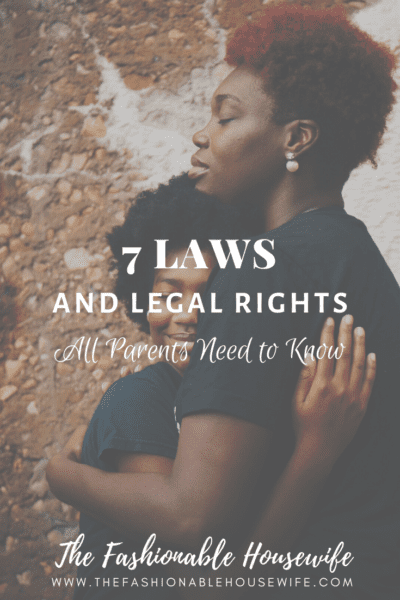
Parents have legal rights for their children. Laws and legal rights are in place at the federal and state level that many parents do not know about. If you’re a new parent, many of these laws will not be a concern for you until your child starts going to school or reaches their volatile teenage years.
But as a parent that is just trying to raise a kid, you need to be aware of these key laws and legal rights.
1. Parental Responsibility Law
You’re a parent, and when your child is a minor, you are responsible for some of their actions. Every state has their own laws on parental responsibility. A few examples of parental responsibility can be seen in:
- California. California State has strict parental responsibility laws for children that are under 18. You can be held liable for “willful misconduct causing injury, death or property damage.” If your child is driving recklessly and ends up causing injuries to someone else, the parent may be held liable for medical expenses up to $25,000.
- New Jersey. In the State of New Jersey, the financial responsibility of the parent is capped at $5,000. Unlike other states, parents are only held liable when the child’s acts causes damages to school property, public utilities and railroads.
Most states do have a cap on how much liability the parent will be responsible for with their minor children. Once a child turns eighteen, the parent is freed from this responsibility.
State laws that require a sponsor to be in a vehicle with a driver under eighteen have these laws in place so that the parent is responsible for auto accidents. These states have what’s called “sponsorship laws.”
If your state has these laws, you will be responsible for any damages caused if you chose to be the child’s sponsor when driving.
Sponsors do not necessarily have to be a parent, but in most cases, the sponsor will be a parent.
You can also be charged with a criminal charge of violating your parental duty to supervise your child when they commit delinquent acts or crimes.
2. Social Host Laws
Teen alcohol consumption is the responsibility of parents. Social host laws vary by jurisdiction, but they generally require that hosts do not provide minors with alcohol. The laws are such that you will not be able to make the alcohol even available in your home.
For example, if your son invites a group of friends over and they drink the alcohol that you have in your cabinets, you may be held responsible.
It doesn’t matter whether or not you knew about the actions of your son and his friends.
Civil damages may also be your responsibility. If a teen drinks alcohol from your home and gets into an accident when leaving the home, you may be legally responsible for their actions.
You, as a parent, should not furnish alcohol to your children or their friends. If you have a wine cabinet or liquor in the house, make sure that it is locked away so that you’re not held responsible for the actions of your children or their friends.
Underage teen drivers may not have any detectable alcohol in their system according to DUI laws. If their blood alcohol registers as 0.01% or higher, they can be convicted of an underage DUI criminal charge. This ultra-low limit can easily be exceeded with just a small taste of alcohol.
3. Student Cell Phone Privacy Rights
Technology and cell phone apps can be a great aid to parenting. But they can also be a source of major issues in this age of bullying and teen sexting. So it’s important your child understand their privacy rights.
According to the ACLU, your child has the right to keep their cell phone, tablet or laptop computer contents and their apps on them private. Schools may not look through your student’s phone without their approval, even if they are using it when not allowed.
There are legal exceptions for emergencies involving danger of death or serious physical injury that require access to the device’s content or when a search warrant is issued by a judge.
4. Right to a Free Education, Even for Immigrant Children
Your child has a right to a free education, even if you’re an immigrant. There may be expenses that go along with education, but this will change with each state’s and district’s policies. Parents will want to investigate their local school laws.
Schools offer free education, but you may have to pay for:
- Lunch
- Groups
- Library book fees
An immigrant’s child is protected under the U.S. Supreme Court’s 1982 decision that found that immigrant children are granted the same rights as a legalized U.S. child.
Immigrant children have a right to receive an education without:
- Fear of discrimination
- Fear of deportation
Enrolling a child in school does not require a parent to provide proof of citizenship or immigration status. Schools should not ask about citizenship, and if they do, you do not have to answer.
5. Children Have Rights to a Safe Environment and Nutrition
As a parent, it’s important to know that your child also has rights. Every child is born with the right to:
- A safe environment
- Healthcare
- Education
- Nutrition
The state can remove the child from the home if basic needs are not being met. You, as the parent, do have the right to raise your child as you see fit. But you need to provide your child with the basic necessities above, or the state has the right to step in and take the child away from you.
Teens and younger children have equal rights and equal protection.
6. Rights Under the Disabilities Education Act
Children that are disabled, whether physically or mentally, do have rights. These rights are granted under the Disabilities Education Act. If your child has difficulty learning or needs extra assistance to meet the same level of education as their peers, they are, by law, allowed to seek special accommodations.
The accommodations will provide your child with the same education as their peers.
For example, a child may need an aid that will help bring the child from class-to-class and also get their books out and possibly help the child with notetaking. The aid will be provided by the school and ensures that a child with physical disabilities has the same rights as other children to receive an education.
If your child needs more time when taking tests, this may also be provided.
Students that have learning disabilities may also be allowed to record classes so that they can go back to the class material on their own time.
Parents can discuss their children’s needs with the school principal or with a teacher to see what assistance may be offered.
7. Right to Information
Children may keep a lot of their life hidden away from their parents, but you do have rights under the Family Educational Rights and Privacy Act. The Act allows you to inspect all of your child’s educational records. If you do not understand the records, you can have them explained to you and corrected as needed.
There are states that have implemented laws that will notify parents if their child is being bullied, too.
You also have the right of reasonable access to school staff and the right to parent-teacher conferences under the “Every Student Succeeds Act of 2015.”
Courts may also change a parent’s legal rights and responsibilities. You may lose your rights to your children, and therefore, your responsibility of them, too. For example, if you lose sole custody of your child, you will not be held responsible for their actions.
But you may also have shared custody in the event of a divorce.
You and the opposing parent will still have to know your legal rights and laws as a parent. If you’re not granted the position of a custodial parent, the other parent will have the final say if you and your ex cannot agree on a matter.
Losing all parental rights and responsibilities is rare, and only in the most severe of cases will a parent lose all rights of their child. When neglect or abuse are present, it’s possible that the parent will lose their parental rights.
If you need legal advice regarding your child’s injury case, contact a personal injury lawyer.
If you think your friends aren’t aware of the laws and legal rights they have as a parent, be sure to share this article!




